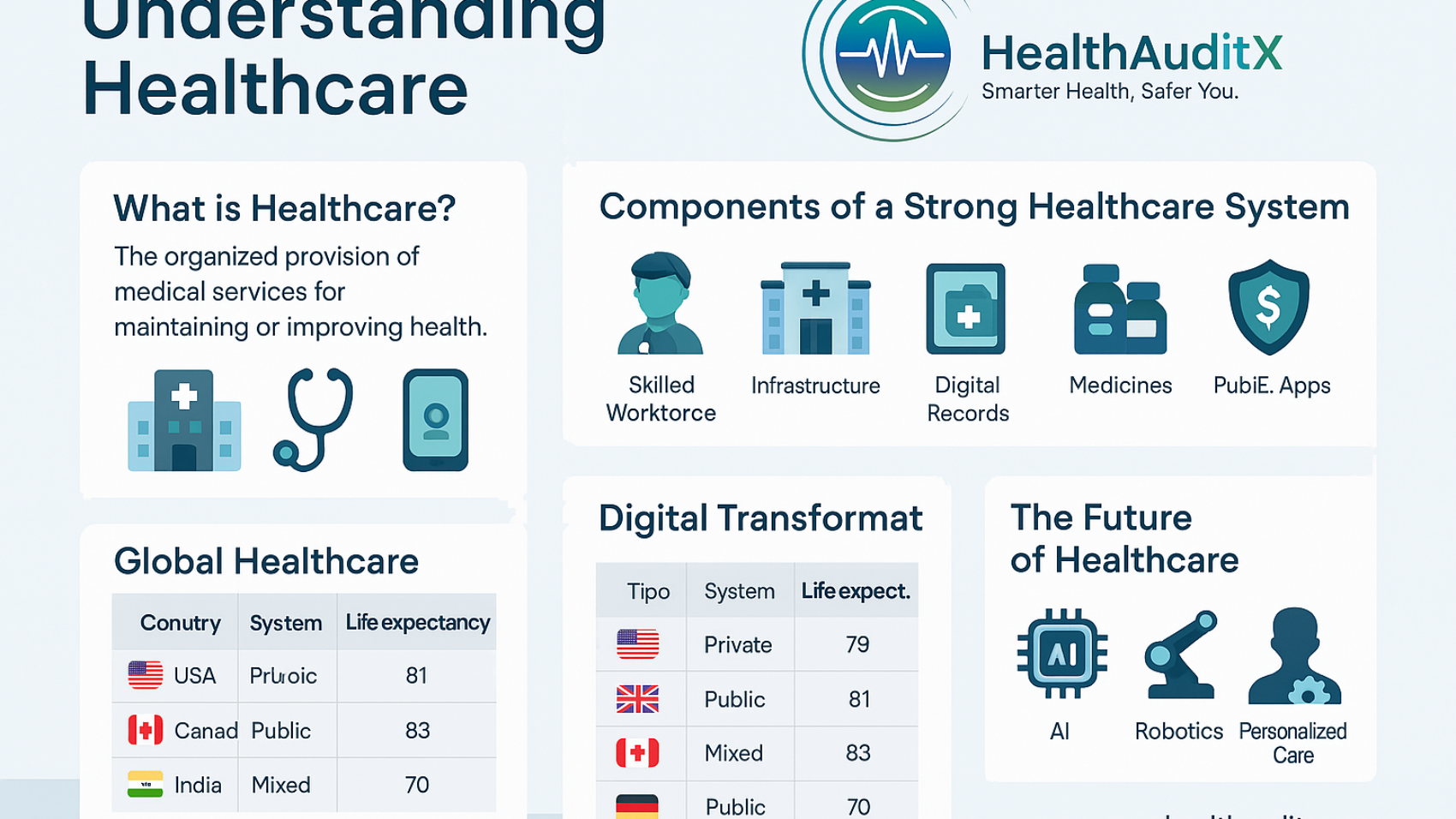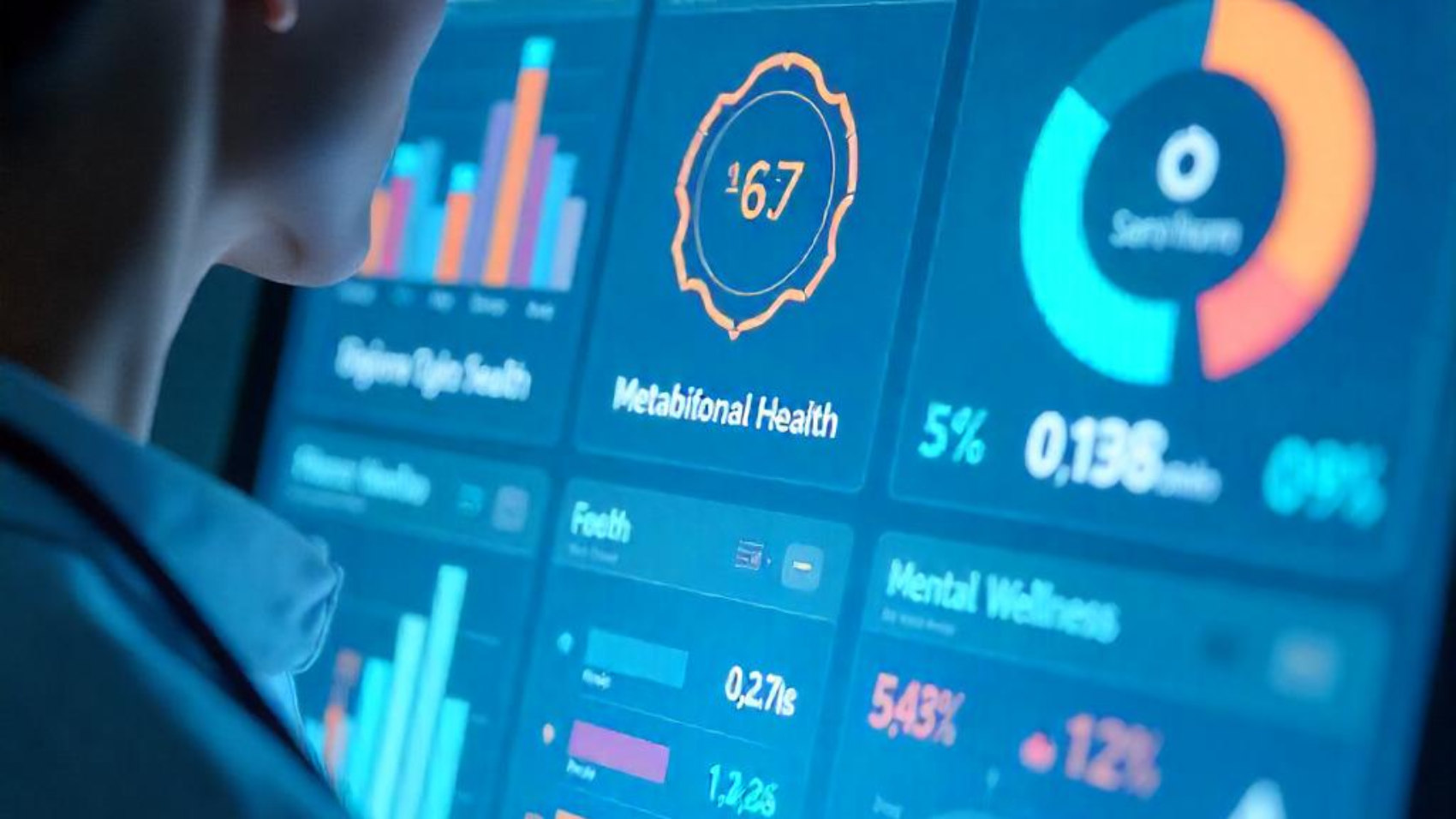Introduction: What is Healthcare?
Healthcare is the organized provision of medical services to individuals or communities for the maintenance or improvement of health. It encompasses everything from preventive care to emergency treatment, from routine checkups to complex surgeries.
In a rapidly evolving world, healthcare is no longer confined to hospitals and clinics. It’s a dynamic, tech-driven ecosystem that includes digital health tools, telemedicine, public health initiatives, and personalized patient care.
The Importance of Healthcare in Modern Society
Healthcare is the backbone of a healthy, functioning society. It affects:
- Life expectancy
- Economic productivity
- Quality of life
- Social equity
Without effective healthcare systems, nations face rising mortality, increasing disease burden, and greater inequality in healthcare access.
Types of Healthcare Services
| Type | Description |
|---|---|
| Primary Care | First contact care (e.g., family doctors, pediatricians) |
| Secondary Care | Specialist services, usually via referral (e.g., cardiologists) |
| Tertiary Care | Advanced, specialized treatment (e.g., cancer centers, neurosurgery) |
| Quaternary Care | Experimental medicine and rare procedures |
Each layer of care is essential in building a comprehensive healthcare system that can handle all patient needs.
Key Components of a Strong Healthcare System
To ensure efficient and equitable care, a healthcare system must include:
 1. Skilled Workforce
1. Skilled Workforce
Doctors, nurses, lab technicians, and support staff play crucial roles in delivering quality medical care.
 2. Health Infrastructure
2. Health Infrastructure
Hospitals, clinics, labs, and equipment must be up-to-date and accessible.
 3. Health Information Systems
3. Health Information Systems
Digital records, analytics, and AI tools help manage data and improve decision-making.
 4. Access to Essential Medicines
4. Access to Essential Medicines
Affordable and consistent access to medications is vital for treating chronic and acute conditions.
 5. Financing and Policy
5. Financing and Policy
A strong framework ensures universal coverage, affordability, and sustainability.
Digital Transformation in Healthcare
The global digital health market is booming. From AI-driven diagnostics to telehealth platforms, technology is reshaping how care is delivered.
Benefits of Digital Healthcare:
- 24/7 access to care through telemedicine
- Personalized treatment via health analytics
- Efficient data sharing across providers
- Remote patient monitoring for chronic diseases
Emerging Trends:
| Trend | Impact |
|---|---|
| AI in Diagnostics | Speeds up disease detection |
| Electronic Health Records (EHRs) | Improves coordination of care |
| Wearables & Health Trackers | Enhances patient engagement |
| Mobile Health Apps | Empowers users to manage health |
Challenges Facing the Healthcare Industry
Despite progress, healthcare systems face several roadblocks:
- Rising Costs: Affordability remains a key issue.
- Inequitable Access: Rural and low-income communities suffer the most.
- Workforce Shortages: Burnout and shortage of skilled professionals.
- Chronic Disease Burden: Lifestyle diseases like diabetes, hypertension, and heart conditions are increasing.
Global Healthcare Systems: A Comparative Glance
| Country | Healthcare Model | Highlights |
|---|---|---|
| UK | Public-funded (NHS) | Universal access, free at point of care |
| USA | Private-public hybrid | World-class tech, but high costs |
| Canada | Single-payer universal system | Accessible and free primary care |
| India | Mixed (private + public) | Large public programs, digital health expansion |
| Germany | Multi-payer system | Mandatory insurance, high quality |
Each model offers lessons in efficiency, equity, and scalability.
How to Improve Healthcare Access and Quality
- Invest in health infrastructure in underserved areas
- Promote digital literacy to use eHealth services
- Increase funding for preventive care and public health
- Train and retain skilled professionals through better incentives
- Implement universal health coverage policies
These strategies can build resilient health systems that serve all populations.
Why Preventive Healthcare Matters
Many diseases can be prevented with early intervention. Preventive care includes:
- Vaccinations
- Routine health checkups
- Screenings for cancers and chronic diseases
- Lifestyle counseling
Focusing on prevention reduces long-term costs and improves quality of life.
The Role of AI in Future Healthcare
Artificial intelligence is set to revolutionize patient care. Examples include:
- Predictive modeling for disease outbreaks
- AI chatbots for symptom analysis
- Machine learning for radiology and pathology reports
- AI-generated personalized treatment plans
These innovations support faster, more accurate, and cost-effective care.
Conclusion: The Future of Healthcare
Healthcare is at a transformative crossroads. With the integration of technology, patient-centric care, and global collaboration, the goal of equitable, accessible, and quality healthcare is more achievable than ever.
Whether you’re a policymaker, healthcare worker, or a patient, being informed and proactive is key to building a healthier future.
FAQs
1. What is universal healthcare?
Universal healthcare refers to a system where every individual has access to necessary medical services without suffering financial hardship.
2. What is the difference between public and private healthcare?
Public healthcare is funded and provided by the government, while private healthcare is funded through personal or insurance payments.
3. How can I access healthcare in rural areas?
Telemedicine, mobile clinics, and government outreach programs are helping bridge the rural health gap.



 Smart Symptom Checker
Smart Symptom Checker Accessible Anytime, Anywhere
Accessible Anytime, Anywhere Visit
Visit Upload your lab reports for instant analysis.
Upload your lab reports for instant analysis. Stay informed. Stay healthy. Stay ahead.
Stay informed. Stay healthy. Stay ahead.
 Why Your Health Deserves a Regular Audit
Why Your Health Deserves a Regular Audit Why You Need a Personalized Health Audit
Why You Need a Personalized Health Audit Age and gender
Age and gender Dietary habits
Dietary habits Lifestyle and stress levels
Lifestyle and stress levels Must-Have Health Checkups You Shouldn’t Skip
Must-Have Health Checkups You Shouldn’t Skip Recommended Health Tests by Age
Recommended Health Tests by Age Understanding Key Health Metrics
Understanding Key Health Metrics Health Audit X evaluates your inputs to flag risks of diabetes and suggests dietary and lifestyle changes.
Health Audit X evaluates your inputs to flag risks of diabetes and suggests dietary and lifestyle changes. Fitness & Nutrition Tracking for Long-Term Health
Fitness & Nutrition Tracking for Long-Term Health High risk of diabetes in 5 years
High risk of diabetes in 5 years Deteriorating heart health trends
Deteriorating heart health trends Nutritional deficiencies likely based on your food log
Nutritional deficiencies likely based on your food log How Health Audit X Helps You Take Control
How Health Audit X Helps You Take Control Preventing Chronic Illnesses Before They Start
Preventing Chronic Illnesses Before They Start Conclusion: Your Health is Your Biggest Asset
Conclusion: Your Health is Your Biggest Asset